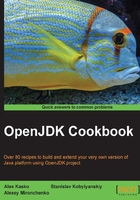
Navigating through OpenJDK groups and projects
OpenJDK is not one huge project. It consists of a large number of subprojects, and is developed by relatively small groups of developers. We will look at them and realize what is going on under the hood of OpenJDK.
Getting ready
To follow this recipe, you will need an OpenJDK instance installed and an established Internet connection. The recipe is more for the initial understanding of the process rather than for practical use, so if you are familiar with these matters, don't hesitate to skip this recipe entirely.
How to do it...
We will see what OpenJDK consists of:
- Go to http://openjdk.java.net/.
- In the right column, there are overviews of groups as well as projects.
- We will select one of them to get through the process.
Tip
The process will be described in detail in Chapter 8, Hacking OpenJDK.
- Let the selected project be
JDK9. - Go to the
JDK9project page at http://openjdk.java.net/projects/jdk9/.
There's not very much to see, because there is only the basic on-boarding information. Most of the project business is in the bug tracker.
After we read the information about the project on an official site, we will go to JDK JIRA to see what's happening here. We will go to the JDK9 part of JIRA at https://bugs.openjdk.java.net/browse/JDK/fixforversion/14949.
Here we can see various issues related directly to JDK9 and see how the process is going.
How it works…
Groups are sets of developers who may work on different projects but in one large scope. Developers participate in chosen projects, and projects are sponsored by groups.
Tip
To participate in a group and become a contributor, follow the instructions at http://openjdk.java.net/contribute/.
There are four major types of projects:
- Feature
- Improvement
- Replacement
- Portability
For example, the JDK9 project is a featured one. The graphics rasterizer project is a replacement one, while the Swing group is a whole group that is focused on the improvement of Swing.
Various ports' projects are obviously the portability ones.
See also
- See Chapter 8, Hacking OpenJDK, Chapter 11, Troubleshooting, and Chapter 13, Build Automation—they will suit you just well
- Tails in Chapter 4, Building OpenJDK 8